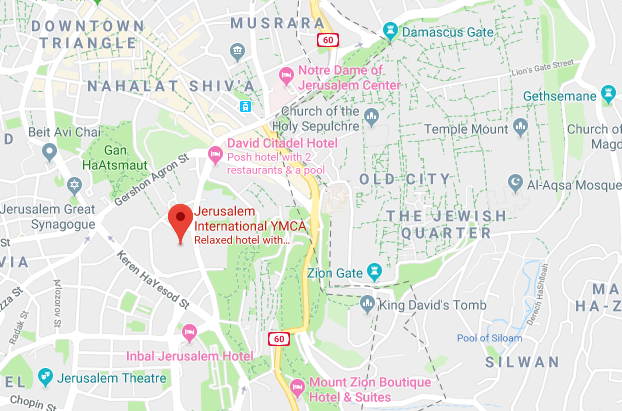In addition to the amplification of unchallenged anti-Israel messaging from Michael Deas (coordinator in Europe for the Palestinian BDS National Committee) already seen by BBC audiences on television and the website on July 21st and heard on the radio on July 23rd, an article by Kevin Connolly which appeared in the ‘Features’ section of the BBC News website’s Middle East page for four consecutive days from July 23rd under the title “Israel looks for answers to boycott campaign” also featured Deas.
Included in Connolly’s report is the film clip of Deas’ unchallenged monologue previously aired on television and promoted separately on the BBC News website. One hundred and sixty-six of the 1,100 words used in Connolly’s report are devoted to further amplification of Deas’ messaging also already seen on other platforms. Notably, despite its appearance in the embedded film clip, Connolly saw fit to further amplify Deas’ call to boycott all Israeli goods in the text of his article too, under the sub-heading “Beyond settlements”.
“The precise terms of the boycott are important.
Some groups want to target Israeli companies that are based in the West Bank – or those that export fruit and vegetables grown there.
Others, including Michael Deas, believe that doesn’t go far enough – and offers this reasoning: “The Palestinian call is for boycotting of all Israeli products.”
“We know some people… are only comfortable with boycotting products that come from settlements. That’s a position we can understand and can sympathise with,” he told the BBC.
“The problem is that Israeli companies… routinely lie about where their products are coming from, so the only safe way for people to avoid buying products from the settlements is not to buy Israeli products altogether.”
In other words, members of the BBC’s audience accessing a range of its content between July 21st and July 23rd 2015 were exposed on five occasions to the message that all Israeli products should be boycotted.
A photograph of workers at a winery appearing immediately after that section of the article is captioned:
“Boycott campaigners say purchasing produce from Jewish settlements helps reinforce Israel’s presence in the occupied West Bank”
Connolly’s report also includes the following quote from Deas, under the sub-heading “Colonialism charge”:
“Michael Deas, campaigns director of the Palestinian Boycott, Divestment and Sanction (BDS) National Committee in London, clearly believes that the tide is running their way.
He argues: “There’s a growing fear inside Israel that it’s facing international isolation of the kind South Africa faced… it’s really interesting that after just 10 years the pressure that we are creating is forcing many ordinary Israelis to question whether Israeli… colonialism is sustainable in the long-term in its current form.””
Connolly of course has no way of verifying that latter spurious claim but he amplifies it anyway. He then goes on to write:
“Israelis regard the word “colonialism” as provocative in this context because it brackets the Zionist settlement of the Holy Land with the European takeovers of territory in Africa, Asia and elsewhere in previous centuries.
Israelis say they are reclaiming an ancient right to the land and shouldn’t therefore be seen as a chapter in the history of colonialism.”
Notably, Connolly makes no effort to independently explain to readers why – beyond what “Israelis say” – the politically motivated charge of ‘colonialism’ does not apply to the Jewish state and he refrains from pointing out that over half of Israel’s population has its roots in ancient Middle Eastern and North African Jewish communities.
Below that section of the article appears an archive photograph of anti-apartheid campaigners in London with the caption “Israel says comparisons with South Africa’s former apartheid regime are nothing more than a smear tactic”. Connolly makes no attempt however to clarify to readers that the BDS campaign’s use of the misnomer ‘apartheid’ in relation to Israel is rather more than just a “smear” and in fact is a deliberate attempt to brand Israel as an entity whose existence cannot be tolerated by the same ‘decent’ people whom Connolly describes as having been affected by the campaign against South African apartheid.
“…more importantly they made it a kind of litmus test of decency to refuse to buy fruit or wine from the Cape.
The precise economic effects may have been debatable but the political impact was significant – it sent a signal to the apartheid regime that it was not part of the global family of decent, developed nations.”
That, of course, is precisely the aim of the BDS campaign and hence it is all the more important for a broadcaster supposedly committed to providing its audiences with accurate and impartial information to clarify why loaded slogans such as ‘apartheid’ and ‘colonialist’ do not apply to Israel. To date, however, the BBC has refrained from doing so.
In addition to his promotion of the notion that the BDS campaign is gaining popular support through the use of phrases such as “the tide is running their way”, Connolly unquestioningly amplifies some of its unproven claims of achievement.
“But the BDS movement feels it can point to clear successes.
It believes it has forced the French infrastructure company, Veolia, to disinvest from the Israeli market through a kind of grassroots campaign asking for example local taxpayers in Europe to persuade their councils not to invest in the firm because it operated in Israeli settlements built on land captured in the war of 1967.”
Although he later half-heartedly adds an appropriate caveat, Connolly refrains from pointing out that Veolia’s business enterprises in human rights abusing Gulf states are of no concern to BDS campaigners.
“Veolia’s official press release at the time couched the decision to sell its businesses in Israel as part of a debt reduction strategy but BDS activists are in no doubt it was a win for them.”
Another photograph used to illustrate the article carries the caption “The Israeli firm SodaStream, which had a factory in the West Bank, was targeted in a high-profile boycott campaign in 2014”. SodaStream of course moved its factory from Mishor Adumim to the Negev for commercial reasons which predated the political campaign against it and not – as the inclusion of this photograph misleadingly implies – because of the BDS campaign.
Connolly’s article predictably includes the following BBC mantra:
“In most interpretations of international law of course – although not Israel’s – those settlements are illegal and are wanted for the construction of a Palestinian state.”
And after four and a half years stationed in Jerusalem, Connolly obviously refuses to understand that Israelis call Judea and Samaria by those titles because that it what they are called – and always were until the Jordanians invented the term ‘West Bank’ to try to justify their belligerent occupation and later unrecognized annexation of the region in 1948.
“One business which won’t be selling up or relocating under overseas political pressure is Yaakov Berg’s winery at Psagot in the hills of the West Bank – or Judea and Samaria as Yaakov prefers to call it, using the area’s biblical names to emphasise its ancient links with the Jews.”
Predictably, Connolly makes no effort to independently inform his readers of the real aims and motives of the BDS campaign and the little information on that topic comes from his Israeli interviewees.
“That’s the kind of reasoning which infuriates Israel’s Deputy Foreign Minister Tzipi Hotovely, who sees calls for a boycott of Israel as anti-Semitic and argues that well-meaning people around the world are being misled by the BDS leaders.
“They don’t care about settlements and they don’t care about borders,” she told me, “All they care about is that Israel shouldn’t exist as a Jewish state.””
Similarly to his audio report on the same topic, Connolly closes with a prediction – in which campaigners trying to bring about an end to Jewish self-determination are whitewashed as “critics”.
“You can expect the calls for a boycott to be one of the major issues between Israel and its critics in the years to come.”
In common with the audio and filmed reports produced around the same time, this article by Connolly provides unchallenged amplification of messaging from Michael Deas, despite the obvious breach of editorial guidelines on impartiality caused by the failure to provide BBC audiences with objective information concerning the BDS campaign’s real aims.
Obviously, no media organization can honestly claim to be accurately and impartially covering a political campaign of any stripe if it consistently fails to tell its audiences to what that campaign really aspires. Like all their predecessors, these latest three chapters in the BBC’s superficial coverage of the BDS campaign exacerbate that ongoing failure.
Related Articles:
More BBC mainstreaming of the anti-Israel BDS campaign – part one
More BBC mainstreaming of the anti-Israel BDS campaign – part two




